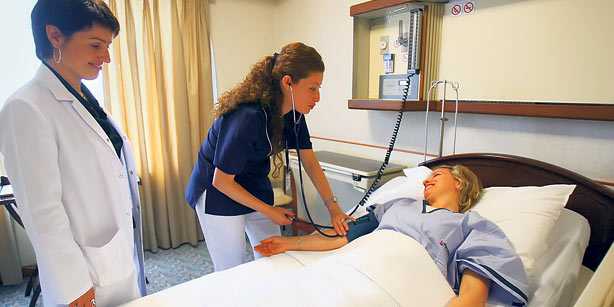|
||||||||||||||
 |
||||||||||||||
| Although there is a tendency to exclude the significance of spirituality in medical care, experts note that it should be regarded as part of medical care. | ||||||||||||||
| The Turkish government currently does not provide spiritual care to patients in state hospitals, something regarded as an essential component for the health of the whole person in the US and European countries. | ||||||||||||||
Providing spiritual care to patients in hospitals to help them recover from their illness has been a matter of discussion at various times in Turkey; however, there are no laws on this issue yet, while spiritual care is a right that is guaranteed by governments in other countries, such as the US and various European countries. Spiritual care is regarded as part of medical care in the US and European countries as they recognize the integration of spiritual, emotional, social, psychological and physical care to be a component of the health of the whole person. Spiritual care is believed to have positive effects on the medical treatment of the patients. Additionally a Bible is available in each patient’s room in hospitals. According to 2010 data, there are 3,000 full-time working chaplains (spiritual care providers) on duty in US hospitals, while there are 4,500 chaplains in the UK: 500 of them working full time, and the rest part time. These chaplains’ duties are to visit all patients, to listen, to pray (if the patients request them to do so), to assist patients in matters of faith, to help them achieve inner peace and strength, to answer any spiritual questions they might have, to bring them a Bible or other sacred texts from their specific faith traditions, to assist them in contacting religious leaders from their faith tradition and to help meet their specific faith or spiritual needs. Working as a Turkish Muslim chaplain in Children’s Hospital Boston of the Harvard Medical School in the US for the past two years, Abrahim Sayar told Sunday’s Zaman that there are generally chaplains of three faiths — Christianity, Judaism and Islam — in US hospitals. A chaplain must pass certain educational requirements to work as a spiritual caregiver in hospitals and also must have a background in religious education. The role of chaplains in the USPointing out that chaplains have a great responsibility in the US, Sayar said chaplains know things doctors don’t know about patients because they provide pastoral counseling and minister to the spiritual, emotional and psychosocial needs of patients, family members and friends at all stages of the treatment process. He added chaplains are sensitive to and supportive of the diverse spiritual and religious needs of patients, medical caregivers and staff. He also said chaplains are highly respected in US society. Nevertheless, in Turkey there aren’t any regulations about providing chaplains in hospitals. Religious officials only take part in a patient’s funeral arrangements. There are no religious materials in patients’ rooms in hospitals. However, the issue of providing spiritual care to patients was brought to the agenda during budget talks in Parliament in 1994 when the Ministry of Health issued a circular to launch an implementation by cooperating with muftis’ offices. The aim of the implementation was to provide spiritual and moral support to patients at their request; but this implementation was misevaluated by some people; they thought that with this regulation the imams would read the Quran beside the patients as though they were dead, which would demoralize patients. Some also opposed the regulation, saying the duties of the chaplains, unless satisfactorily defined, could cause chaos in hospitals. As a result of this opposition, the Council of State granted a stay of execution for the implementation and then repealed the regulation in 1996. An imam in a state mosque, İbrahim Tunç told Sunday’s Zaman that there is currently no regulation enabling religious officials to give spiritual guidance and care to patients in hospitals where patients need spiritual support most because they feel depressed and hopeless. He added that patients need spiritual guidance to recover from illnesses as well as medicine in hospitals. Dr. Lütfi Öztürk, an internal medicine specialist, told Sunday’s Zaman that spiritual care boosts the morale of patients, and good morale affects the immune system positively; so spiritual care helps patients recover from illnesses. Spirituality excluded from medical careHe said spirituality does not fit easily with people’s understanding of science and what constitutes scientific truth, and there is a tendency to exclude the significance of spirituality in medical care, but it is necessary. Öztürk added that spiritual care should be regarded as part of medical care. Dr. Öztürk said that especially in Islam, illness is seen as a present to humans, helping people get closer to God. When the patients are told this, they are more motivated to endure their illnesses. A cancer patient who wishes to remain anonymous said patients suffering from cancer suffer from a variety of stresses and are often anxious or depressed. She added that especially during the end-of-life stage, patients are prone to fear the approaching death and suffer from a sense of solitude and alienation; spiritual care helps these patients feel they are not alone and that being ill is not the end of their life. “Unfortunately in Turkey such services do not exist; I experienced a breakdown after I heard I had cancer, so I rejected treatment for a while because I felt no hope at all; there should be spiritual services in Turkish hospitals — but especially in the treatment of patients suffering from deadly diseases,” she said. An official from the Turkish Religious Affairs Directorate, Ahmet Çelik told Sunday’s Zaman that adopting a regulation about this issue is not currently on the agenda, but added that it is essential because patients need their spiritual concerns to be addressed, too. Çelik said he believes this issue will be on the agenda soon, but this process should be planned very well. Religious officers who give spiritual care to patients should take in-service training to meet the psychological, social and religious needs of patients satisfactorily. He added that chaplains should gain an insight into the best way to communicate with a person. If such a regulation is adopted, this implementation should be evaluated in a pilot program. |
||||||||||||||
Tag: Health care
-

Unlike US and European countries, Turkey does not provide spiritual care in hospitals
-

Kingdom, Turkey to cooperate in health affairs
By SAEED AL-KHOTANI | ARAB NEWS
Published: Nov 18, 2010 23:48 Updated: Nov 18, 2010 23:48
MINA: The Kingdom is to cooperate with Turkey in matters relating to healthcare, including the manufacturing of blood plasma, said Minister of Health Dr. Abdullah Al-Rabeeah.
The health minister made the announcement after meeting Professor Rajab Akdagh, the Turkish minister of health, at the Mina Emergency Hospital on Wednesday.
“We will also cooperate with the Turkish Ministry of Health in exchanging expertise in mass gathering management, particularly in information technology relating to Haj,” said Al-Rabeeah. “Furthermore, we will receive Turkish physicians to work along with their Saudi counterparts in providing health care to pilgrims and sharing experience,” he added.
Al-Rabeeah also took his Turkish counterpart on a tour of the Haj Healthcare Operation and Control Center from where all health-care facilities in Makkah and the holy sites are managed. Following a presentation on the center, Akdagh asked Al-Rabeeah to allow a team of Turkish experts to observe it. Al-Rabbeah accepted the request saying it would be a pleasure.
Akdagh also commended the successful way the Kingdom manages such a large number of pilgrims every year, providing them with multiple types of services, especially in health care.
Seventy thousand Turkish pilgrims performed Haj this year.
-

The NHS: Health care needs to be depoliticised and patient led
Reforming the NHS is so vital that we shouldn’t have to wait until after the next election, says Helen Evans .

With the NHS again moving centre stage in the run-up to the general election, the mainstream political parties will be quick to reassure voters that nationalised health care will only be safe in their hands. Indeed, we have already seen campaign messages from David Cameron’s Conservatives promising that they will “cut the deficit, not the NHS”.
However, in reality, the UK’s structural financial situation is now so dire that the NHS will have to be substantively overhauled, irrespective of who wins the next general election or whatever they say beforehand. Rather than simply wait for the next government, Nurses for Reform (NFR) believes that as front-line carers, nurses must now put the case for a fundamentally different and better health-care system.
That is why NFR not only recognises the urgent need for reform, it also believes too many nursing and medical trade unions remain wedded to fundamentally old and outdated ideas. Instead of promoting substantive reform – and in doing so, championing the rights of patients and consumers – they predictably default to the short-term platitudes of demanding more taxpayers’ money or new forms of legislative favour. Such an approach is not only disastrous for nurses and the other medical professions, it is also catastrophic for patients.
NFR believes that the next government must liberate health provision from the costly and counterproductive world of top-down and un-innovative state control. On a practical level, this means a detailed consideration of the following key points:
- All health provision in the UK, such as hospitals, clinics and care homes, should be placed in the independent sector, be it for-profit, co-operative, or not-for-profit forms of ownership. What matters here is genuine diversity and openness.
- Following the logic of planned Conservative Party changes to education and schools, local planning laws must be reformed in order to enable a much greater diversity of – and non-government investment in – health facilities. In a truly post-bureaucratic age, the Secretary of State for Health should no longer have any say over when or where hospitals are built, opened or closed, and nor should local politicians.
- The laws surrounding health censorship should be repealed so that patients can be empowered with much greater information. In this context, hospitals, GP practices and pharmaceutical enterprises should all be free to advertise and build trusted brands. Only by allowing reputations to be freely built will people be able to realise the advantages of competitive standards and judge for themselves who they can trust in a health-care market.
- National collective pay- bargaining for health professionals should be ended, monopoly bodies such as the General Medical Council and the Nursing and Midwifery Council should be opened up to genuine private alternatives, and all health-related training should be paid for by independent providers – thereby boosting the diversity and opportunities available in a more vibrant labour market.
- Finally, tax-funded “public health” should regain the trust of people by only concerning itself with those areas that specifically overlap with, and are akin to, warfare: for example, natural disasters and pandemics. Beyond these limits, any further health initiatives aimed at informing or nannying people should only be undertaken by independent-sector organisations, be they for-profit or not-for-profit, and providing they do not use any taxpayers’ money in their execution. All initiatives should be created and funded without any involvement from any aspect of the public sector, again including local government.
Today, more than ever, such a package of reforms is necessary so that health care is finally depoliticised and led by the people who matter most: patients as consumers. In short, we can do a lot better than the NHS without ever going the way of highly regulated and state-funded American health care. What we need is a genuine market.
The Telegraph
